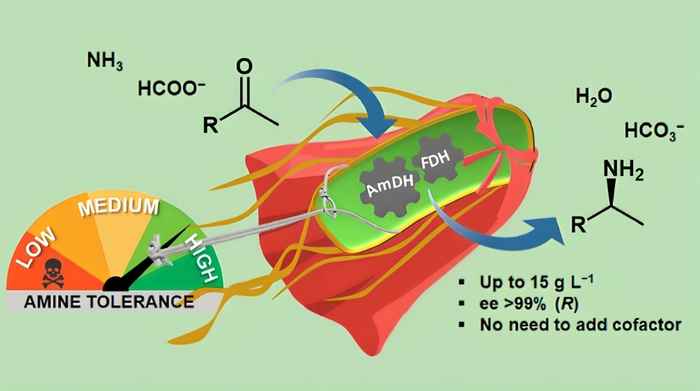Amine-tolerant E. coli strains for sustainable synthesis of chiral amines
26 September 2024

In earlier research, the Biocatalysis group reported on the synthesis of enantiomerically pure amines from alcohols using resting E. coli BL21(DE3) cells, with ammonia from the aqueous buffer as the sole nitrogen source. At that time, the application of the bio-amination in vivo was limited due to the toxicity of most amine products resulting from the biotransformations.
For the new paper, the researchers collaborated with Dr Carine Vergne-Vaxelaire at Genoscope in Paris to develop E. coli strains with improved amine tolerance. Joint PhD student Josemarco Mendoza Avila performed directed evolution in continuous culture to adapt the E. coli BL21(DE3) cells to tolerate 100 mM hexan-2-amine, making them six times more resistant than the wild-type. The adapted strains also display superior tolerance to structurally diverse amines. The new strains, coexpressing amine dehydrogenase and formate dehydrogenase genes, facilitate the efficient stereoselective bioamination of prochiral ketones (ee >99%) with up to 80% conversion at a substrate concentration of 200 mM, without the need for added cofactors.
Abstract, as published with the paper
The biocatalytic synthesis of chiral amines from carbonyl compounds and ammonia is a major advance in sustainable synthetic chemistry. Using whole cells for bioamination reactions is advantageous given their low preparation cost and direct applicability; however, amine toxicity limits the reaction when living cells are used. Herein, we adapted Escherichia coli BL21(DE3) cells to grow in the presence of 100 mM hexan-2-amine via directed evolution in continuous culture, obtaining six times more tolerant strains than the wild-type. The adapted strains also displayed superior tolerance for structurally different amines. Coexpression of genes encoding for amine dehydrogenase (AmDH) and formate dehydrogenase activities in the adapted strains enabled the stereoselective bioamination (ee > 99%) of different prochiral ketones with up to 80% conversion at high substrate loading (up to 200 mM) without exogenous cofactor addition. The adapted cells displayed longer survival and higher population density during the reactions. The present biotechnological E. coli system contributes to the development of more robust biocatalysis for amine production.
Paper details
Josemarco Mendoza-Avila, Volker Döring, Madeleine Bouzon, Ivan Dubois, Tanja Knaus, Louis M. M. Mouterde, Anne Zaparucha, Francesco G. Mutti, Carine Vergne-Vaxelaire: Amine-Tolerant E. coli Strains Generated via Adaptive Evolution for Sustainable Synthesis of Chiral Amines. ACS Sustainable Chemistry & Engineering, Article ASAP, DOI: 10.1021/acssuschemeng.4c04356
See also
- Biocatalysis research group (Van ‘t Hoff Institute for Molecular Sciences, University of Amsterdam)
- Organic Chemistry and Biocatalysis Laboratory (Genoscope, François Jacob Institute of Biology, Paris)